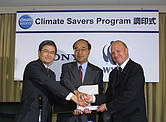 As nations gathered to discuss climate change in Paris, twelve major corporations recommitted their pledge, and reported they are on course to eliminate at least ten million tons of CO2 emissions annually by 2010. The 12 international companies joined the Climate Savers Programme and are glad they did. It turns out, reducing pollutants that cause global warming is profitable as well as responsible…
As nations gathered to discuss climate change in Paris, twelve major corporations recommitted their pledge, and reported they are on course to eliminate at least ten million tons of CO2 emissions annually by 2010. The 12 international companies joined the Climate Savers Programme and are glad they did. It turns out, reducing pollutants that cause global warming is profitable as well as responsible…
If an additional 1,300 large companies joined the group under the direction of the World Wildlife Fund, emission reduction targets set out in the Kyoto Protocol would be achieved.
“The Climate Savers companies show that sustainable development is not an academic concept but something that can be tackled with a profit," says Hans Verolme, Director of WWF’s Global Climate Change Programme, "for nature, for society, but also for the companies themselves.”
Sony has joined WWF’s Climate Savers Programme, announcing that it will cut its absolute CO2 emissions from both operations and its product range by 7 percent by 2010.
"We believe it is crucial to keep global warming below the 2°C danger threshold,” says Serge Foucher, Executive Vice President of Sony Europe GmbH. “We hope to prove that joint action across the globe can actually achieve this. Sony has committed not only to reduce greenhouse gas emissions from its own facilities globally, but also to improve the energy efficiency of its products.”
At WWF’s Climate Savers conference, taking place in Paris from 1–2 February, sportswear manufacturer Nike received an award for having already reached its CO2 reduction target.
“Participation in Climate Savers enabled us to get an early start on an issue that has major consequences for business and society,” says Sarah Severn, Director of Nike’s Corporate Responsibility Horizons. “We have found that constraints can lead to tremendous innovation and despite growth in our owned and managed operations we have become more efficient with our energy use. Our next steps will be partnering with suppliers to further reduce our manufacturing and logistics climate footprint.”
The conference was organized by WWF as an opportunity for these firms to show other corporations the way forward to reduce absolute carbon emissions. WWF continues to urge lawmakers and corporate executives around the world to move now and reduce absolute CO2 emissions.
The ten other Climate Savers working with WWF to find innovative emission reductions include: Johnson & Johnson, IBM, Polaroid, Collins, Xanterra (United States), Sagawa, Lafarge (France), Catalyst (Canada), Tetra Pak (Sweden), and Novo Nordisk (Denmark).
"Lafarge made its climate savers commitment to reduce its CO2 emissions back in 2001,” says Bruno Lafont, CEO of Lafarge, a world leader in building materials. “Since then, we have worked hard to extend this initiative within the cement sector and we are pleased that a number of other major cement players have decided to commit themselves as well."



















